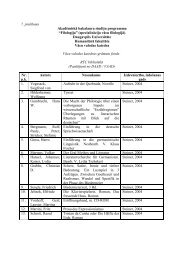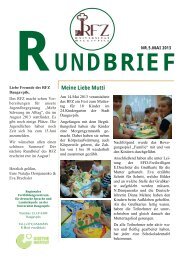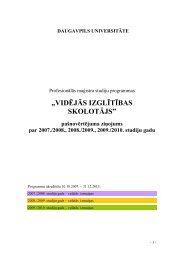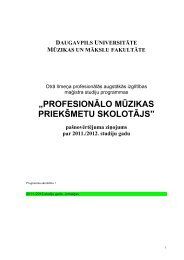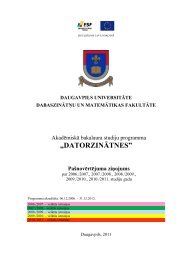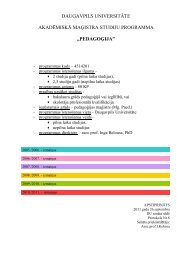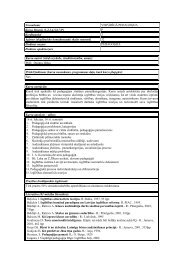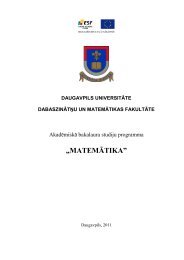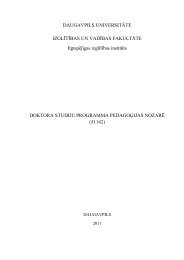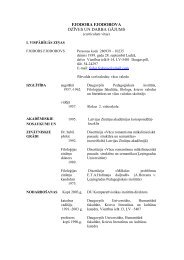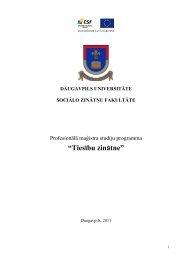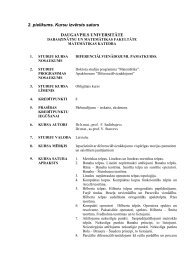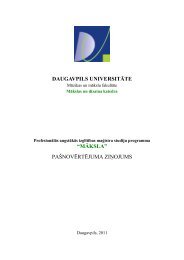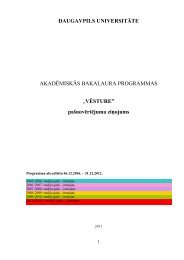- Page 1 and 2:
DAUGAVPILS UNIVERSITĀTE IZGLĪTĪB
- Page 3 and 4:
SATURS 1. STUDIJU PROGRAMMAS VISPĀ
- Page 5 and 6:
1. STUDIJU PROGRAMMAS VISPĀRĪGS R
- Page 7 and 8:
2007./2008. studiju gads - izmaiľu
- Page 9 and 10:
2007./2008. studiju gads - izmaiľu
- Page 11 and 12:
2. Mācību plānu teorija, izveide
- Page 13 and 14:
Vizuālās mākslas mācību 3 Dr.P
- Page 15 and 16:
2005./2006. studiju gads - studiju
- Page 17 and 18:
35 36 37 38 39 40 41 42 43 44 45 46
- Page 19 and 20:
17 12 1 12 10 profesori 23% as.prof
- Page 21 and 22:
11 12 13 14 15 16 17 18 19 20 21 22
- Page 23 and 24:
2009./2010. studiju gadā - akadēm
- Page 25 and 26:
2007./2008. studiju gads - Studiju
- Page 27 and 28:
2007./2008. studiju gads - Akadēmi
- Page 29 and 30:
prezentāciju un uzdevumus citiem s
- Page 31 and 32:
(Igaunija), Tamperes Tehnoloģiskā
- Page 33 and 34:
specializācija - 51 KP; Pētniecī
- Page 35 and 36:
ir vai kādreiz ir bijuši šīs st
- Page 37 and 38:
eigās. Personāla zinātniskā un
- Page 39 and 40:
Maģistra studiju programmas „Ped
- Page 41 and 42:
Pārbau- Kursa Kursa 1. studiju gad
- Page 43 and 44:
Pārbau- Kursa Kursa 1. studiju gad
- Page 45 and 46:
Akadēmiskās studiju programmas
- Page 47 and 48:
Pārbau- Kursa Kursa 1. studiju gad
- Page 49 and 50:
Akadēmiskās studiju programmas
- Page 51 and 52:
Pārbau- Kursa Kursa 1. studiju gad
- Page 53 and 54:
Akadēmiskās studiju programmas
- Page 55 and 56:
Pārbau- Kursa Kursa 1. studiju gad
- Page 57 and 58:
Maģistra studiju programmas „Ped
- Page 59 and 60:
Pārbau- Kursa Kursa 1. studiju gad
- Page 61 and 62:
Pārbau- Kursa Kursa 1. studiju gad
- Page 63 and 64:
Akadēmiskās studiju programmas
- Page 65 and 66:
Pārbau- Kursa Kursa 1. studiju gad
- Page 67 and 68:
Akadēmiskās studiju programmas
- Page 69 and 70:
Pārbau- Kursa Kursa 1. studiju gad
- Page 71 and 72:
Akadēmiskās studiju programmas
- Page 73 and 74:
Pārbau- Kursa Kursa 1. studiju gad
- Page 75 and 76:
Maģistra studiju programmas „Ped
- Page 77 and 78:
publicēšanai Pētījumu rezultāt
- Page 79 and 80:
Sociālā pedagoģija Speciālā pe
- Page 81 and 82:
Maģistra studiju programmas „Ped
- Page 83 and 84:
Zinātniska raksta sagatavošana pu
- Page 85 and 86: Personības attīstības teorijas u
- Page 87 and 88: Personības attīstības teorijas u
- Page 89 and 90: 2. Teorētisko atziľu aprobācija
- Page 91 and 92: Pamatskolas pedagoģija Pirmsskolas
- Page 93 and 94: Maģistra studiju programmas „Ped
- Page 95 and 96: Apstiprināts IVF Domes sēdē 2005
- Page 97 and 98: MAĢISTRA STUDIJU PROGRAMMAS “PED
- Page 99 and 100: MAĢISTRA STUDIJU PROGRAMMAS “PED
- Page 101 and 102: 2. PIELIKUMS Maģistra studiju prog
- Page 103 and 104: Nosaukums PĒTĪJUMA METODOLOĢIJA
- Page 105 and 106: 29. Norusis, M. SPSS 13.0 Guide to
- Page 107 and 108: 10. Clark, E.T. Jr. (1997) Designin
- Page 109 and 110: Nosaukums MĀCĪBU PLĀNA TEORIJA,
- Page 111 and 112: Nosaukums PEDAGOĢIJAS TEORIJU KRIT
- Page 113 and 114: 2. “Assessment in Education: Prin
- Page 115 and 116: aktuālas problēmas. Mācību un i
- Page 117 and 118: Nosaukums IZVĒLĒTĀS PEDAGOĢIJAS
- Page 119 and 120: 42. Svence, G.Pieaugušo psiholoģi
- Page 121 and 122: 3. “Māksla+” 4. “Educational
- Page 123 and 124: 6. Krastiľa E., Bērziľa Ţ., Lū
- Page 125 and 126: Nosaukums PERSONĪBAS ATTĪSTĪBAS
- Page 127 and 128: Vaciago Smith - editor. Publisher:
- Page 129 and 130: saturs, līmenis un kvalitāte, int
- Page 131 and 132: Nosaukums PIEAUGUŠO IZGLĪTĪBAS T
- Page 133 and 134: 50. Young, R. 1999. A critical theo
- Page 135: Zvaigzne. 8. Karpova, Ā., Plotniek
- Page 139 and 140: Nosaukums VIZUĀLĀ KULTŪRA IZGLĪ
- Page 141 and 142: Vizuālo mākslu ţurnāls “Studi
- Page 143 and 144: 2. Avotiľš V. Prindule L. Bērnu
- Page 145 and 146: 6. “Mentoring and Tutoring: Partn
- Page 147 and 148: 3. PIELIKUMS Akadēmiskā personāl
- Page 149 and 150: PERSONĀLS Akadēmiskais personāls
- Page 151 and 152: PĒTNIECISKĀ BĀZE Veisson) Igauni
- Page 153 and 154: PROJEKTI Starptautiskie projekti (t
- Page 155 and 156: kā pētnieki] ES Leonardo da Vinci
- Page 157 and 158: Anita Pipere Ilga Salīte Dzintra I
- Page 159 and 160: Salīte, I. (2009). Ilgtspējīga i
- Page 161 and 162: Research and Implementation of Educ
- Page 163 and 164: Conference of Daugavpils University
- Page 165 and 166: Development and the Exibition Pasau
- Page 167 and 168: nodrošināšanai: izglītības vad
- Page 169 and 170: Universitāte STARPTAUTISKĀ SADARB
- Page 171 and 172: izglītības iestādē Oļehnoviča
- Page 173 and 174: Tatjana Racina Agnija Reine Maija R
- Page 175 and 176: 40. Aija Skarbiniece Pedagogu darba
- Page 177 and 178: 7. starptautiskā konference “Sus
- Page 179 and 180: KOPSAVILKUMS Atskaite satur inform
- Page 181 and 182: Vārds, uzvārds Zinātniskais grā
- Page 183 and 184: PĒTNIECISKĀ BĀZE Ieplānots izve
- Page 185 and 186: DU IZM projekti Projekta nosaukums,
- Page 187 and 188:
ZINĀTNISKIE IZDEVUMI Izdotie zinā
- Page 189 and 190:
7. Makarevičs, V. (2008) Formation
- Page 191 and 192:
- konferences kopsavilkuma veidoša
- Page 193 and 194:
ISREV XVI (2008) International semi
- Page 195 and 196:
konference “Tolerance and Intoler
- Page 197 and 198:
ERASMUS apmaiľas programmas viesle
- Page 199 and 200:
Darbs ārvalstu zinātniskajās bib
- Page 201 and 202:
Aija Korotkova Jauniešu konfliktu
- Page 203 and 204:
3. Daugavpils Zinātnes festivāls
- Page 205 and 206:
Daugavpils Universitātes Izglītī
- Page 207 and 208:
Vārds, uzvārds: Inga Belousa Zin
- Page 209 and 210:
Ilgtspējīgas izglītības instit
- Page 211 and 212:
DU doktorantu granti pedagoģijā:
- Page 213 and 214:
Ulla Harkonena (Ulla Härkönen) Dr
- Page 215 and 216:
(2) CARIPSIE projektā „Bērns k
- Page 217 and 218:
“Educational contributions to bui
- Page 219 and 220:
DU IZM projekti Projekta nosaukums,
- Page 221 and 222:
Anonīmi recenzētu un starptautisk
- Page 223 and 224:
2. Kokina, I., Davidova, J.(2007) M
- Page 225 and 226:
6. Skrinda A. (2007.) Understanding
- Page 227 and 228:
2. Guseva, S., Dombrovskis, V., Ili
- Page 229 and 230:
13. Skrinda A. (2007.) Universals o
- Page 231 and 232:
2. Kazakevicha. I. (2007). Recreati
- Page 233 and 234:
European Society of women in Theolo
- Page 235 and 236:
Olga iespējas krievu valodas kā
- Page 237 and 238:
15. Makarevičs V. Iepazīšanās a
- Page 239 and 240:
Daugavpils Universitātes IZGLĪTĪ
- Page 241 and 242:
Mākslas, personības izaugsmes psi
- Page 243 and 244:
Vārds, uzvārds Zin. grāds, Organ
- Page 245 and 246:
maģistra studiju programmās psiho
- Page 247 and 248:
(re)generation: creating and sustai
- Page 249 and 250:
Ilisko, Dz. (2006c) The Challenges
- Page 251 and 252:
Citi izdevumi Jakovleva, J. & Piper
- Page 253 and 254:
16. Kravale M., 2006.g. 31.maijs -
- Page 255 and 256:
43. Salīte I., 2006.g. 20.-22.apr
- Page 257 and 258:
� Latvijas Universitātes ikgadē
- Page 259 and 260:
Kalpojot asociācijas misijai konfe
- Page 261 and 262:
DAUGAVPILS UNIVERSITĀTE IZGLITĪBA
- Page 263 and 264:
Galvenie zinātniskās darbības vi
- Page 265 and 266:
Intercultural and Media Education
- Page 267 and 268:
Development: First Steps toward Cha
- Page 269 and 270:
Jauno zinātnieku konference Daugav
- Page 271 and 272:
Sergejs Čapulis Piedalīšanās Iz
- Page 273 and 274:
SATURS KOPSAVILKUMS ...............
- Page 275 and 276:
3.1. Zinātnisko pētījumu nodaļa
- Page 277 and 278:
Ievēlēšanas termiľš: 2002. - 2
- Page 279 and 280:
projekta “Skolotāju izglītības
- Page 281 and 282:
iedziļināsies izglītības pētī
- Page 283 and 284:
61/0007 Latgales reģiona mūţizgl
- Page 285 and 286:
Kopā: 312 + 98 = 410 lpp. publicē
- Page 287 and 288:
Kravale M. Young People‟s Life Sp
- Page 289 and 290:
Jaunas sadarbības iespējas tika a
- Page 291 and 292:
23. Dombrovskis V., 2005.g. 22-26.o
- Page 293 and 294:
konference “ STARPTAUTISKĀ SADAR
- Page 295 and 296:
Institūta dalībnieki: I.Belousa,
- Page 297 and 298:
Aptauja un rekomendācijas vadlīni
- Page 299 and 300:
3. STUDIJU PLĀNA LĪMENIS Atslēga
- Page 301 and 302:
6.3. pievērsties izglītības pār
- Page 303 and 304:
Nacionālā programma "Vienotas met
- Page 305 and 306:
ES Leonardo da Vinči programmas pr
- Page 307 and 308:
Pamatojums Daugavpils Universitāte
- Page 309 and 310:
DU (1996); Dr.psih., asoc.prof. Ani
- Page 311 and 312:
Dr.ped., prof. Elfrīda Krastiņa D
- Page 313 and 314:
Pašreizējās promocijas padomes p
- Page 315 and 316:
DU starptautisk a-jās konferencēs
- Page 317 and 318:
DAUGAVPILS UNIVERSITĀTE IZGLĪTĪB
- Page 319 and 320:
KOPSAVILKUMS IVF Mācību metodiku
- Page 321 and 322:
e-pasta adrese: duspn2004@one.lv 10
- Page 323 and 324:
Citi projekti Projekta nosaukums Da
- Page 325 and 326:
SIMPOZIJI, KONFERENCES, KONGRESI Pi
- Page 327 and 328:
Citi ārzemju komandējumi (darbs z
- Page 329 and 330:
Nr. V1 V2 Valsts studiju vietas bā
- Page 331 and 332:
Studiju programmas koeficienti: Bak
- Page 333 and 334:
6. PIELIKUMS Reklāmas un informat
- Page 335 and 336:
7. PIELIKUMS Maģistra studiju prog
- Page 337 and 338:
MAĢISTRA STUDIJU PROGRAMMĀ „PED
- Page 339 and 340:
MAĢISTRA STUDIJU PROGRAMMĀ “PED
- Page 341 and 342:
1. 2. 3. 4. 5. 6. 7. 8. 9. 10. 11.
- Page 343 and 344:
48. 49. 50. 51. 52. 53. 54. 55. 56.
- Page 345 and 346:
Maģistra studiju programmā “Ped
- Page 347 and 348:
49. Gorjačkina Ģimenes iesaistī
- Page 349 and 350:
95. Rakstiľa Zita Interaktīvo met
- Page 351 and 352:
8. PIELIKUMS Maģistra studiju prog
- Page 353 and 354:
Zinātniskie raksti: 1. Pipere A.,
- Page 355 and 356:
Darba pieredze tālāk izglītībā
- Page 357 and 358:
KONFERENČU REFERĀTI th 11 Interna
- Page 359 and 360:
2008./2009.studiju gadā maģistra
- Page 361 and 362:
Curriculum Vitae Dace Vereba Mob.t
- Page 363 and 364:
CURRICULUM VITAE Vārds, uzvārds:
- Page 365 and 366:
Vārds, uzvārds: Ivars Austers e-p
- Page 367 and 368:
Reľģe, V., Austers, I. (2004). So
- Page 369 and 370:
Mūsdienu sociālās psiholoģijas
- Page 371 and 372:
2007./2008.studiju gadā maģistra
- Page 373 and 374:
curriculum vitae OLGA ARHIPOVA Dzim
- Page 375 and 376:
5. Svarīgākās publikācijas: 1.
- Page 377 and 378:
Pedagoģiskā darbība Vadītie Doc
- Page 379 and 380:
Izglītības attīstības centrs
- Page 381 and 382:
Kravale M. 2005.gads 21 -23. jūlij
- Page 383 and 384:
Ģimenes pedagoģija Skolotāja pro
- Page 385 and 386:
Mičule, I. 2007.15.-16.marts (Latv
- Page 388 and 389:
IEKŠĒJIE FAKTORI ĀRĒJIE FAKTORI



